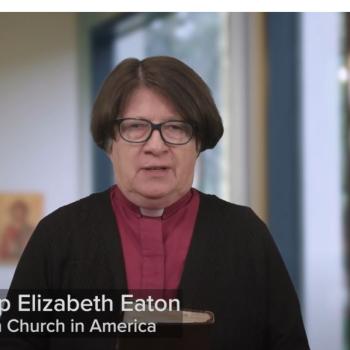Palm Sunday’s “Hosanna” takes on a new meaning in the time of the coronavirus epidemic.
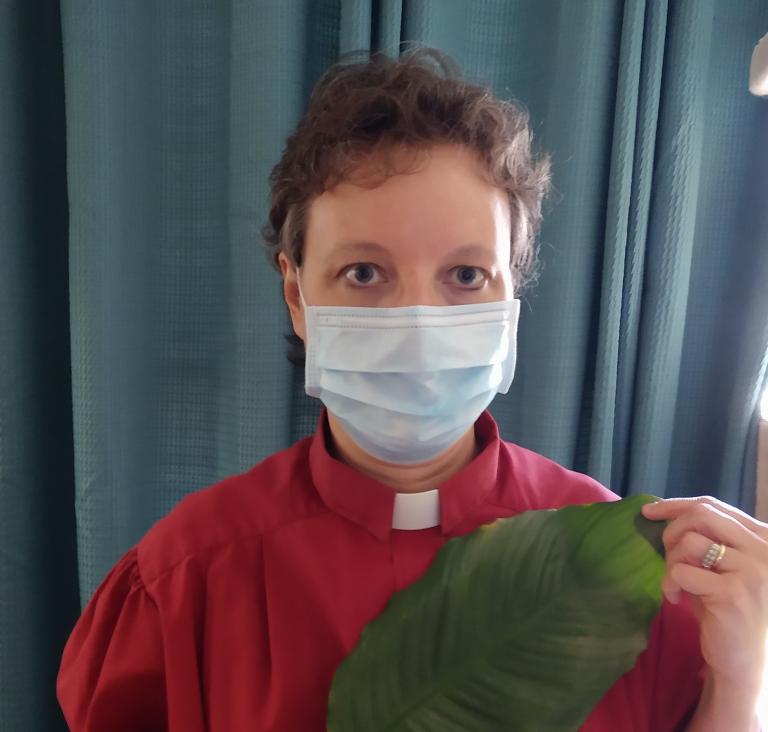
For many of us who have heard the story of Palm Sunday so many times, we may miss the political significance of what is happening here. This is a provocative scene – Jesus coming into Jerusalem with crowds of people announcing him as a king. This is a dangerous thing, because in the Roman Empire, there can be no king but Caesar. What’s more, Jesus is actually mocking earthly rulers by what he’s doing – riding on a donkey.
Why is riding a donkey a problem?
Well, the crowds call Jesus, “Son of David.” This means they regarded him as the rightful heir of the throne of Israel. They thought of him as a king. They knew the stories about Jesus’ power – healing the sick, casting out demons, bravely confronting the religious authorities. To the crowd, this was their hoped-for Messiah. This was the Anointed One whom they had been longing for since the glory days when King David ruled over Israel and conquered the surrounding lands.
But does this “king” come riding into Jerusalem on a gilded chariot befitting someone of his stature? No. Does he ride a fabulously decorated steed and regally trot through the gate? No. He’s sitting on a donkey.
For a contemporary comparison, think of how the president of a country travels.
In the U.S., they use Air Force One, a private military jet. And they ride in an armored limo surrounded by an armored motorcade that speeds through the city.
Now imagine if, instead of this stately motorcade, a president was riding in one of those little clown cars. All political jokes aside, this would be a comical sight, wouldn’t it?
The humor in this situation would not have been lost on the crowds gathered along the roadside. In fact, they might have been a little put off by what they saw. What does Jesus think he’s doing, riding a donkey into Jerusalem?
This is not befitting the king of Israel. What’s going on here?
There they are, spreading their cloaks and palm branches in front of him. They’re indicating how highly they regard Jesus. It would be like laying out the red carpet at the Oscars only to have the movie star walk in wearing muddy boots and work clothes. They are throwing down their cloaks and palms for this man they adore, but he’s acting like a commoner. See, Jesus is actually poking fun at himself. He’s satirizing the pedestal upon which they are trying to place him.
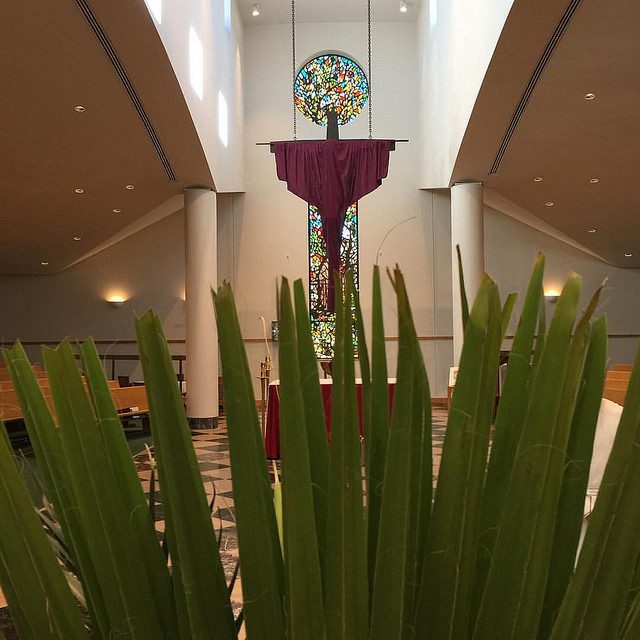
But this doesn’t stop them. Undeterred by the comic discrepancy, the crowd is shouting, “Hosanna to the Son of David! Blessed is the one who comes in the name of the Lord! Hosanna in the highest heaven!”
I want to pause on this word, “Hosanna.” Do you know what the word “hosanna” means?
In Hebrew and Aramaic, Hosanna means, “Save us, we pray.”
That is a prayer that has been on the lips of millions, perhaps billions of people across the globe these last few months. As the coronavirus has spread throughout the world, taking down country after country like some kind of biblical plague, many have been overwhelmed with fear and anxiety. Those who succumb to the virus are often wracked by pain in their bodies, their lungs attacked and scarred. And families who have lost loved ones are devastated.
For the rest of us, many are facing unprecedented pressures in a world that feels like it’s been turned upside down. Households are disrupted by spouses and loved ones out of work. Or pulling extra shifts if they’re in essential personnel. Young kids are now at home during school hours. College students have scrambled to leave campus. The constraints of social distancing seem to stretch on without end. And many are facing a precarious economic situation all the way around.
In the midst of this, congregations are trying to figure out what it means to be church in this unprecedented time.
When we most need to be together, we can’t even gather in our sacred spaces and hold each other’s hands or offer a comforting embrace. Collectively, we are crying out or simply whispering through tears, “Save us, we pray.”

So where is God in the midst of this?
In these last few weeks and right now, we are all experiencing a time when things have changed in ways we could never have imagined only a few weeks ago. We’re feeling disoriented. And for some, it can be a crisis of faith.
So, it turns out that Holy Week could not be coming at a better time.
The week leading up to Jesus’s last supper, his arrest in the garden, his trial, and his crucifixion – this was a crisis of faith for the disciples. Their world was completely upended. Violence, corruption, the heartlessness of certain religious and government leaders, the grandstanding of Pilate, the injustice of sentencing an innocent man to death – all of it echoes so loudly in our own time.
So where is God in all this?
I submit to you that Jesus has indeed come into our midst in ways we might not immediately recognize. Jesus comes to us through what we might call our “Hosanna people.”
Who are our Hosanna people?
They are the medical workers who are literally saving lives.
Doctors, nurses, pharmacists, all medical personnel are trying to keep the life-breath in us. And many of them are doing this work without sufficient resources, beds, and personal protective equipment. They are fighting for our lives. And through them, Jesus is answering the prayer, “Save us, we pray.”
Our Hosanna people are the ones who grow and harvest our food.
They are the truckers who bring the goods we need driving endless hours and stretches of road. They are the grocery workers who stock our shelves. And the drivers who deliver food to the homes of people who are quarantined. They are working to keep us alive by bringing us the food we need – including the very bread you will eat and the wine or juice you will drink for communion. Through them, Jesus is answering the prayer, “Save us, we pray.”
Our Hosanna people are the utility workers.
They make sure we have clean, flowing water and electricity to power our homes and the ventilators that are keeping people alive. They are unseen, but they are vital to our survival.
Our Hosanna people are the first responders.
Military, police, fire fighters, emergency personnel. They are the ones who put themselves in danger in order to save lives.
And our Hosanna people are those who clean.
The sanitation workers, the janitors and cleaning crews who are literally saving lives by washing and wiping and sanitizing and deep cleaning. Through them, Jesus is answering the prayer, “Save us, we pray.”
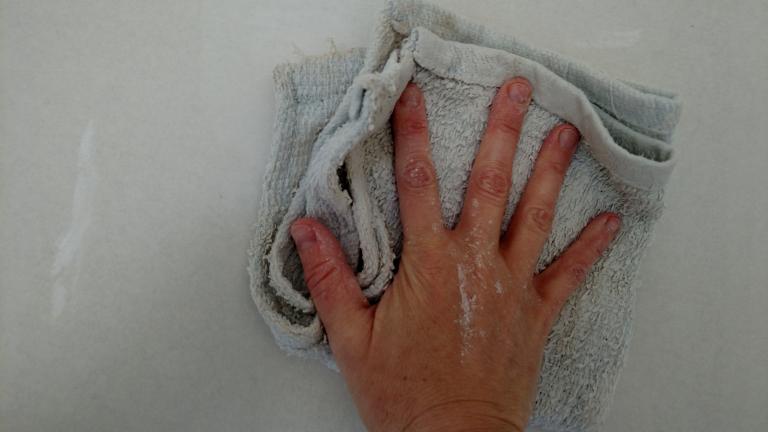
Remember them on Maundy Thursday when we tell the story of Jesus washing the feet of his disciples. These people who clean our toilets, who sweep our floors and empty our trash, who clean our hotel rooms and sort through our recycling. Always on the lowest economic rung, often female, sometimes undocumented – they are washing our feet and we don’t even realize it.
These are people we often look down upon and the ones we pay the least. But they are our Hosanna people. They are responding to needs. Theirs is holy work. They are the answer to someone’s prayer, “Save us, pray.” Theirs is a divine vocation.
You see, Jesus comes through them and for them.
If someone of his social status – a rabbi – came into town on a lowly donkey and did common foot washing, what did that mean for everyone else? Those with a higher social status were brought down a notch. And those who were lowly, their status was lifted by virtue of Jesus performing this act and doing this work.
So I encourage you to lay down your cloaks and palms for the Hosanna people, knowing that Jesus is coming through them and for them, and for us. We can see and hear that there are far too many people crying out, “Save us, we pray.” These are people we often ignore and dismiss. Many of them do not receive enough pay for a living wage. Many do not even have the benefit of basic healthcare.
Yet they are responding to this call: “Save us, we pray!”
So we can work to rebuild our world, our financial systems, our healthcare systems, our communities, and yes, even our churches, in a way that comes closer to the Realm of God that Jesus initiated on the back of that donkey.
Jesus comes right into a broken and upside-down world so that we may see with new eyes, discover compassion within our hearts, and devote our minds and hands to creating something new and just and good.
We who receive God’s love in Jesus are called to love each other, to be servants to each other, just as Jesus became our servant. When we share this worship service – we are doing this together, even though we are separated by time and distance.
It is in these moments—in washing, serving, and sharing worship—that we experience God’s love. And we extend this love to those who are so selflessly giving of their time, their health, their labor, and their commitment to their neighbors.
When we advocate for them, for those who have served us, then we, too, will be an answer to their prayer, “Save us, we pray.”
Then, together, we will all be a Hosanna people.
Amen.
Read also:
When Earth Demands Sabbath: Learning from the Coronavirus Pandemic
More than Eco-Palms: Ecojustice and Palm Sunday
Those Who Wash: The Divine Disorientation of Maundy Thursday
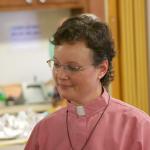 Leah D. Schade is the Assistant Professor of Preaching and Worship at Lexington Theological Seminary in Kentucky and ordained in the ELCA. Dr. Schade does not speak for LTS or the ELCA; her opinions are her own. She is the author of Preaching in the Purple Zone: Ministry in the Red-Blue Divide (Rowman & Littlefield, 2019), Rooted and Rising: Voices of Courage in a Time of Climate Crisis (Rowman & Littlefield, 2019), and Creation-Crisis Preaching: Ecology, Theology, and the Pulpit (Chalice Press, 2015).
Leah D. Schade is the Assistant Professor of Preaching and Worship at Lexington Theological Seminary in Kentucky and ordained in the ELCA. Dr. Schade does not speak for LTS or the ELCA; her opinions are her own. She is the author of Preaching in the Purple Zone: Ministry in the Red-Blue Divide (Rowman & Littlefield, 2019), Rooted and Rising: Voices of Courage in a Time of Climate Crisis (Rowman & Littlefield, 2019), and Creation-Crisis Preaching: Ecology, Theology, and the Pulpit (Chalice Press, 2015).
Leah’s latest book is a Lenten devotional centered on Creation: For the Beauty of the Earth (Chalice Press, 2020).
Twitter: @LeahSchade
Facebook: https://www.facebook.com/LeahDSchade/






